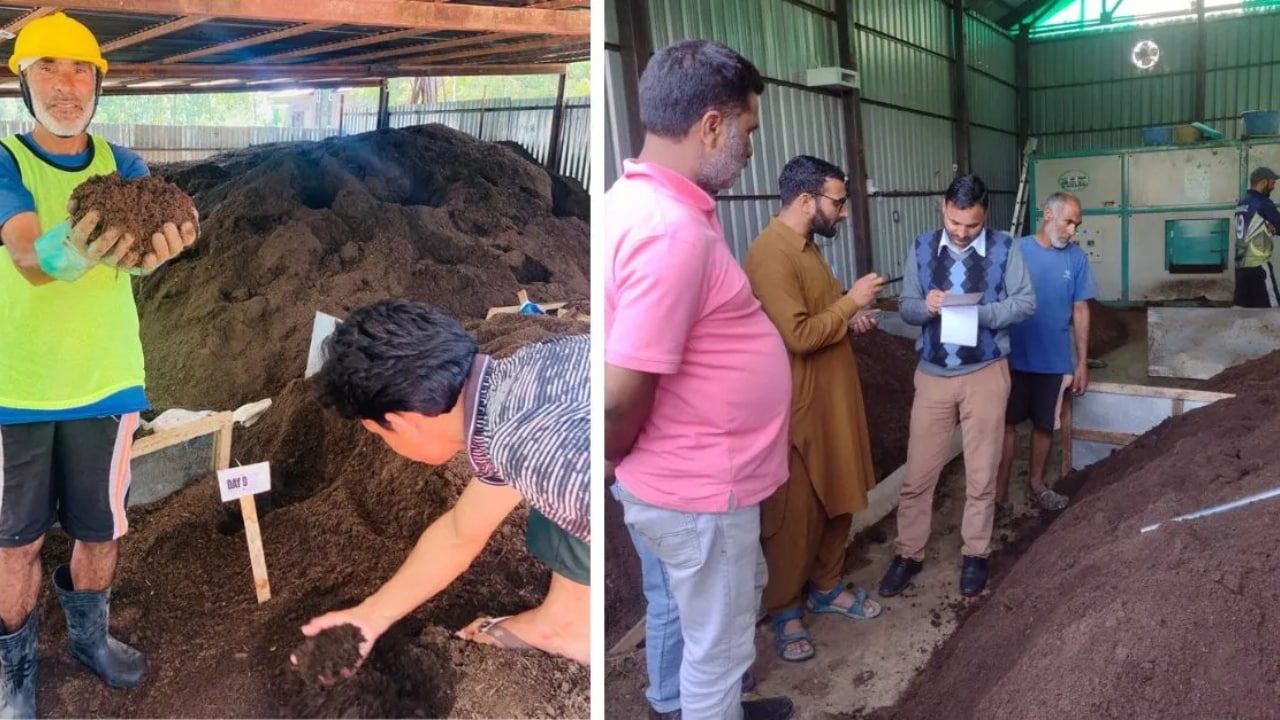Kashmir: What if the trash piling up outside your home could earn money, improve soil, and provide livelihoods to your community? Mohammad Aamir Khan, a 30-year-old engineer from South Kashmir, is proving this is possible. Through his ventures, Green Wave and Waste to Health, Aamir has transformed a single compost pit into a thriving, decentralised waste management model that now serves over 4,000 households across multiple districts. By converting biodegradable waste into compost, recycling plastic into industrial raw material, and transforming polythene into handloom products, Aamir has created a sustainable ecosystem that combines environmental stewardship with economic empowerment.
Early Life And InspirationAamir grew up in Agroo Devsar, a village in Kulgam district. After earning an engineering degree in Bengaluru in 2017, he attempted the UPSC Civil Services Examination. Falling short by a narrow margin, he instead turned his focus to environmental solutions.
“Be it plastic, biodegradable waste or polythene, I saw how it was degrading our environment,” Aamir recalls.
“I became obsessed with understanding how other parts of the world managed waste and what solutions could work in our local context,” he added.
This observation, paired with years of study and research on grassroots composting and decentralised waste systems, laid the foundation for his future ventures.
Fellowship With Clinton Global InitiativeIn 2022, Aamir applied to the Clinton Global Initiative University (CGI U) for a fellowship in sustainable, ground-level solutions. His proposal for a decentralized, community-based waste management system was selected.
“Training under CGI U was transformative,” he says.
“I learnt leadership, execution strategies, and how to scale grassroots innovations. It gave me the confidence to bring my ideas to life.” he added.
Launching The Compost ModelIn 2023, Aamir launched his first composting unit on his land in Zahipora, Kulgam. The initiative converts household biodegradable waste into high-quality organic fertiliser branded as Green Wave.
“We demonstrated our composting model to Jammu and Kashmir’s Rural Development Department,” he says.
“They were impressed and signed a Memorandum of Understanding to operationalize the model across four blocks — Kulgam, Qaimoh, Pahloo, and Pombay,” he added.
Government support, including transportation of waste from households to the unit, allowed the program to expand to Anantnag and Bijbehara, covering over 4,000 households.
Expanding Into Plastic Recycling And Digital PlatformsIn 2024, Aamir took a step further by establishing a plastic recycling unit in Chahkpora and launching an e-commerce platform, www.wastetohealth.co . Residents could now schedule waste pickups, while collected plastics were converted into granular flakes for industrial use.
“Users create an account, upload pictures of their plastic or aluminium waste, and we collect it from their homes,” Aamir explains.
“We recycle materials into granular flakes, which are sold to industries making pipes, furniture, and other products,” he added.
Innovative Polythene SolutionsPolythene, previously considered non-recyclable locally, posed a unique challenge. Aamir and his team developed a method to convert it into thread, which could then be woven into eco-friendly bags and chadars using traditional handlooms.
“Polythene has no resale or recycling value in traditional markets. We integrated it into the local handicrafts sector and trained people to turn waste into useful products,” he says.
The products were first showcased during the Amarnath Yatra, drawing attention for their vibrant design and environmental significance.
View this post on InstagramA post shared by Responsible Tourism Society (@rtsoi.in)
Economic And Social Impact
Aamir’s initiatives have created employment for over 25 locals, spanning machine operators, compost specialists, artisans, and logistics staff. The compost is sold directly to farmers, while recycled plastic and handloom products generate income for households.
Javid Ahmad, a 28-year-old from Bijbehara, says, “Firstly, he has inspired many by showing that nothing goes to waste in this world, we can convert waste into eco-friendly products and create livelihood opportunities for others. People now think twice before throwing plastic away.”
Revenue And RecognitionThe model is also financially successful. “Last year, our revenue was Rs 50 lakh,” Aamir shares. “This year, we’ve already clocked Rs 80 lakh from compost sales, plastic recycling, and chadar production.”
In January 2024, Aamir received a personal letter of appreciation from former US President Bill Clinton, acknowledging his mentorship role in CGI U 2023.
Vision For The FutureFor Aamir, the mission goes beyond numbers. “I come from a farmer’s family. My goal is to build a zero-waste ecosystem in Kashmir that is sustainable, inclusive, and scalable,” he says.
Plans are underway to expand operations to more districts and develop a mobile app for waste tracking and logistics, making sustainability accessible and actionable for every household.
“We’ve shown that it’s possible,” he adds. “Now, the goal is to reach more people, create more jobs, and prove that sustainability isn’t a dream. It’s already happening , here, in our homes, with our waste.”
You may also like

BBC fans left divided over Rob Rinder and Rylan Clark's latest TV series

"Flooding under control, Delhi ready for winter pollution fight": CM Rekha Gupta

Vernon Kay says Ricky Hatton's death has 'hit' him as he shares friend's touching act

I tried Sainsbury's new Christmas food range — this is the one dish to look out for this year

Income Tax Return Deadline Missed? Here's What Penalties and Problems You May Face







